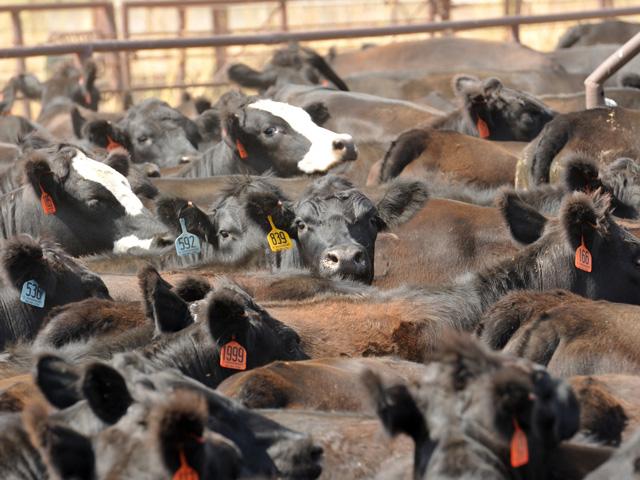Easterday's Tyson Lawsuits Dismissed
Rancher Running Ghost Cattle Scheme Loses Two Lawsuits Against Tyson Fresh Meats
LINCOLN, Neb. (DTN) -- Former eastern Washington rancher Cody Easterday's legal pursuit against Tyson Fresh Meats has ended as a federal court dismisses two lawsuits filed by the man convicted of wire fraud and serving an 11-year prison sentence in Los Angeles for conducting a so-called ghost-cattle scheme.
Easterday pleaded guilty to perpetuating a so-called "ghost cattle" scheme for billing Tyson to the tune of $233 million for raising cattle that didn't exist. Court documents show Easterday conducted the scheme in an attempt to make up for losses he sustained in the futures market.
At the end of October, the U.S. District Court for the District of Eastern Washington dismissed a January 2023 lawsuit by Easterday alleging Tyson Fresh Meats owed him money for breach of contract from selling his beef.
Easterday alleged the company never paid for the use of his name and likeness as part of a joint venture that involved the marketing and selling of premium beef from his ranch. The former rancher told the court Tyson owes him about $100 million.
The court issued an order Oct. 31, 2023, granting Tyson's motion to dismiss that case.
"Either way, plaintiff has failed to allege sufficient facts to show there was a meeting of the minds regarding the terms of the alleged oral contract," the court said.
"As such, plaintiff has failed to allege facts to support a claim that there was a legally enforceable contract between himself and defendant."
On Aug. 28, 2023, the court dismissed another lawsuit filed by Easterday against Tyson alleging the company had committed a number of antitrust violations and violated the Packers and Stockyards Act during a 10-year business relationship.
P[L1] D[0x0] M[300x250] OOP[F] ADUNIT[] T[]
According to the court's order, Easterday does not have standing to assert the federal antitrust claims "because each of the claims relates to contracts between defendant and Easterday Ranches," but not Easterday individually.
"Plaintiff's partial ownership in the property where the cattle was fed is insufficient to give him standing to sue defendant for alleged acts that were not targeted towards his role as a property owner or landlord."
Easterday alleged that Tyson took advantage of Easterday Ranches' limitations as to where the company could sell its cattle.
In addition, Easterday alleged Tyson "misused its economic power over cattle feeders and contracts," violating the Packers and Stockyards Act of 1921, the Sherman Antitrust Act of 1890 and the Washington State Consumer Protection Act.
Easterday alleged Tyson took advantage of what is a unique packing situation in the Pacific Northwest. Tyson's packing plant in Pasco, Washington, is one of just two such companies within a 200-mile radius of where Easterday Ranches operated, according to the lawsuit.
In 2009, Tyson and Easterday discussed the possibility of increasing capacity at his feedlots.
In the months following pleading guilty to wire fraud, Easterday raised tens of millions of dollars through asset sales in an attempt to make restitution to Tyson.
The Easterday Ranches saga drew national attention when a company connected to the Church of Jesus Christ Latter-day Saints was the winning bidder for the Easterday assets. The second-highest bidder was an investment company tied to Microsoft founder Bill Gates.
According to court documents in U.S. Bankruptcy Court for the District of Eastern Washington, Farmland Reserve, owned by the church, was awarded the winning bid of $209 million for the Easterday assets.
Easterday operated an extensive family farm operation in eastern Washington involved in cattle feeding as well as 22,500 acres of potatoes, onions, corn and wheat in the Columbia Basin.
Beginning in 2016 and continuing through November 2020, Easterday submitted false and fraudulent invoices and other information to Tyson and another company.
The Easterday Ranches Inc. owner received reimbursement from the companies for the purported purchase and raising of cattle the company never actually bought.
Read more on DTN:
"Easterday Sentenced to 11 Years in Prison," https://www.dtnpf.com/…
"Winning Bid on Easterday Assets: $209M," https://www.dtnpf.com/…
"WA Rancher Admits 'Ghost-Cattle' Scam," https://www.dtnpf.com/…
Todd Neeley can be reached at todd.neeley@dtn.com.
Follow him on X, formerly known as Twitter, @DTNeeley.
(c) Copyright 2023 DTN, LLC. All rights reserved.



